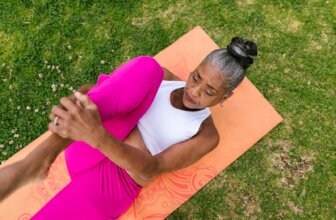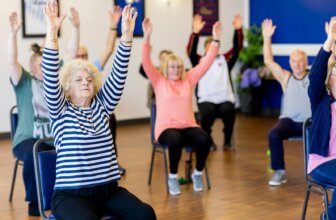Essential Tips for Active Aging
Aging is a journey filled with new experiences, wisdom, and opportunities. However, it also comes with changes in physical and mental health. Many people believe that declining health is an unavoidable part of aging, but the truth is, staying healthy after 65 is possible with the right habits.
By making small yet meaningful lifestyle changes, older adults can continue to live vibrant and fulfilling lives. Whether it’s maintaining an active routine, eating well, or staying socially engaged, prioritizing health can make all the difference.
This guide will explore how to stay healthy after 65, covering fitness, nutrition, mental well-being, and preventive care to help seniors thrive. But before we continue, a quick disclaimer!
This article offers experienced and well-researched information but isn’t a substitute for medical advice. Consult your healthcare provider for personal guidance.
Prioritizing a Healthy Lifestyle After 65
A healthy lifestyle isn’t about drastic changes but small, consistent choices supporting long-term well-being. Here are the key areas to focus on:
- Nutrition: Eating a balanced diet supports energy levels, immune function, and overall vitality.
- Physical activity: Moving daily keeps the heart strong, improves flexibility, and reduces the risk of falls.
- Sleep quality: A restful night’s sleep helps with memory, mood, and physical recovery.
- Social engagement: Staying connected with loved ones helps prevent loneliness and depression.
By focusing on these, seniors can maintain independence and enjoy a high quality of life.

Best Exercises for Seniors Over 65
Staying active is one of the best ways to age gracefully and maintain mobility. Exercise helps prevent chronic conditions like heart disease, diabetes, and osteoporosis while improving strength and balance.
Recommended Exercises:
- Walking: A low-impact activity that improves circulation and cardiovascular health. Nordic Pole Walking is super low-impact!
- Swimming or Water Aerobics: Great for joint health and muscle strengthening without putting strain on the body.
- Yoga & Tai Chi: Enhance flexibility, balance, and mental relaxation.
- Strength Training: Helps maintain muscle mass and bone density, reducing the risk of falls.
Even 15-30 minutes of movement each day can lead to significant health benefits. Finding an enjoyable activity, whether dancing, gardening, or stretching, can make exercise a daily habit.
Healthy Eating for Seniors: Nutrition for Longevity
What we eat directly impacts how we feel, especially as we age. Healthy eating for seniors focuses on nutrient-rich foods that support energy, digestion, and disease prevention.
Key Nutrients for Seniors:
- Protein: Supports muscle health and immune function (lean meats, eggs, beans).
- Calcium & Vitamin D: Essential for bone strength (dairy, leafy greens, fortified foods).
- Fiber: Aids digestion and prevents constipation (whole grains, vegetables, fruits).
- Omega-3 Fatty Acids: Supports brain health and reduces inflammation (salmon, walnuts, flaxseeds).
Foods to Limit:
- Processed foods high in sugar and sodium
- Fried or greasy foods that may impact heart health
- Excess caffeine or alcohol, which can affect hydration and sleep
A well-balanced diet, combined with proper hydration, is crucial for maintaining energy and overall well-being.
Mental Health Tips for Seniors
Cognitive and emotional well-being are just as important as physical health. As people age, staying mentally sharp and emotionally balanced contributes to a happier life.
Ways to Keep the Mind Active:
- Learning new skills: Reading, playing instruments, or taking up a new hobby.
- Brain games & puzzles: Crossword puzzles, Sudoku, and memory games stimulate the brain.
- Social engagement: Spending time with family, volunteering, or joining clubs helps prevent loneliness.
- Mindfulness & Relaxation: Practicing meditation or deep breathing reduces stress.
A positive mindset plays a big role in healthy aging. Surrounding oneself with supportive people and engaging in enjoyable activities can improve overall happiness.
Common Health Problems After 65 & Preventive Care
As we age, the risk of certain health conditions increases. However, regular check-ups and early detection can help manage or even prevent serious issues.
Common Health Concerns:
- Heart disease: High blood pressure and cholesterol require monitoring.
- Arthritis: Joint pain can be managed with movement and proper diet.
- Diabetes: Blood sugar levels should be checked regularly.
- Dementia & Memory Loss: Early detection can lead to better care options.
Preventive Health Steps:
- Annual check-ups & screenings for blood pressure, cholesterol, and cancer.
- Medication management to prevent side effects or interactions.
- Vaccinations to protect against flu, pneumonia, and shingles.
- Fall prevention strategies like improving home safety and strengthening balance.
Proactive healthcare ensures that aging adults maintain independence and enjoy life to the fullest.
Conclusion: The Secret to Aging Well
The key to staying healthy after 65 is making small, sustainable changes that promote overall well-being. Focusing on exercise, nutrition, mental health, and preventive care can help seniors live an active, fulfilling life.
Aging is not about slowing down, it’s about embracing new ways to stay strong, engaged, and independent. By prioritizing health, seniors can continue to enjoy life’s beautiful moments for years to come.
And speaking of exercise! How about checking out our guide on Good Exercise for Seniors: Benefits and Best Practices?
Thanks for reading.
Busy Bat





